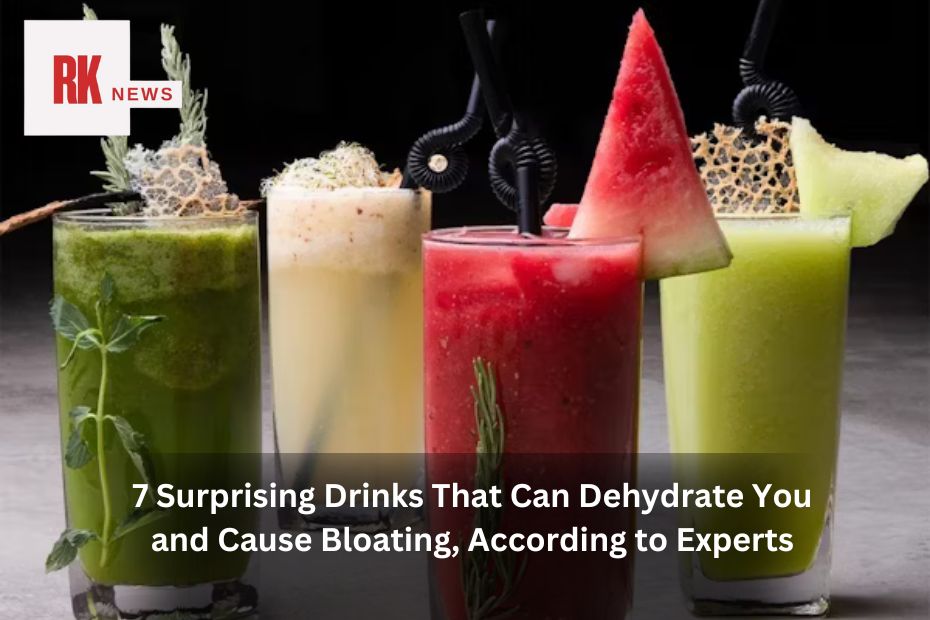It would seem contradictory that some drinks might cause dehydration rather than hydration. Many popular drinks, meanwhile, are heavy in sugar, sodium, and caffeine, all of which can cause bloating and deplete your body. Knowing which choices to avoid will help you to keep these problems at distance. Fortunately, we can offer some professional guidance here.
To highlight several drinks that might be undermining your hydration objectives, we chatted with functional diagnostic nutrition practitioner (FDN-P) Elizabeth Katzman and registered dietitian and personal trainer Jesse Feder. These seven beverages can shockingly cause you to lose water and aggravate bloating.
Smoothies With Fruit Heavy Content
Usually a wonderful method to include important nutrients into your diet in a tasty, mixed bundle are fruit smoothies. Still, the sugar level might be worrisome and sometimes even dehydrating. Katzman states “smoothies, especially those heavy in fruit sugars, can draw water into the digestive tract to process their high sugar content, temporarily reducing hydration elsewhere in the body and often causing bloating.” Eat entire fruit; it provides a good combination of natural sugars and fiber.
Vegetable Juice Made Store- Bought
Usually hailed as the healthiest foods available, vegetables may be surprising to learn Katzman claims vegetable juice could be a bad option for individuals trying to avoid bloating and dehydration. As it happens, a lot of store-bought choices include concealed sodium. “A single serving may contain up to 500mg of sodium, roughly 20% of the advised daily intake,” she says. Apart from upsetting the body’s natural fluid balance, excess salt can lead to water retention and bloating.
Marketing Coconut Water
Though coconut water is sometimes hailed for its electrolytes, not all choices are made equal. “Many commercial coconut waters now have added sugars and preservatives that lessen their natural hydrating qualities while increasing their bloating potential,” Katzman says. Always read labels; choose pure, unsweeteled coconut water.
Fruit Juices
Like smoothies, fruit juices may pack startlingly high sugar content into your diet. “The high sugar content causes the kidneys to increase urine production to rid the body of extra sugar,” Feder notes. One can get dehydration from this diuretic action. Moreover, Feder says “the high sugar content can also cause gut inflammation and water retention, which can lead to bloating as well.” Fruit juice could appear like a good choice, but for hydration the absence of fiber and strong sugar concentration can be troublesome.
Herbal Teas with Diuretic Effects
Often acting as effective anti-inflammatory elixirs, herbal teas can be rather good for your health. For hydration, they are not always the best option though. “Several types of herbal teas, particularly those including dandelion or juniper, have natural diuretic properties that can increase urination without adequately replacing lost fluids,” notes Katzman. Key for hydration is selecting choices free of diuretic effects.
Energy Drinks
Energy drinks could wake you up, but the health risks of all that caffeine might not be justified. One of the major offenders among caffeinated drinks is their many dehydrating components. “The average energy drink contains 150–200 mg of caffeine alongside synthetic elements that can trigger inflammatory responses in sensitive individuals,” Katzman says. Many also include artificial sweeteners and too high B vitamins, which among other hazards can stress the kidneys and cause more dehydration.
Flavored Iced Teas
Although pre-made iced teas from convenience stores and coffee shops seem cool, they typically doubly dehydrate. Katzman says, “seemingly healthy iced teas often pack both caffeine and excessive sugar—sometimes up to 30g per serving—creating a double dehydrating effect as your body requires significant water to process these ingredients.”
